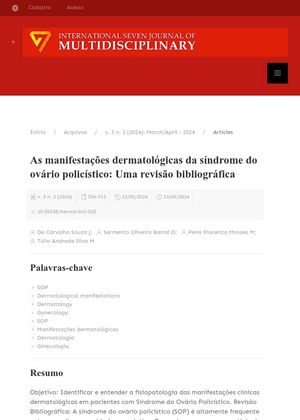TLDR PCOS causes skin issues like excess hair, acne, and hair loss, needing a team approach for treatment.
This review aims to understand the dermatological manifestations of Polycystic Ovary Syndrome (PCOS), a common condition among reproductive-age women. Diagnosed using the Rotterdam criteria, PCOS presents with symptoms like hirsutism, acne vulgaris, acanthosis nigricans, seborrheic dermatitis, androgenetic alopecia, and severe cases of virilization. These dermatological issues, along with systemic, gynecological, and reproductive symptoms, significantly reduce the quality of life, causing complications such as infertility. Effective management requires a multidisciplinary approach and clinical control of androgen levels.

PCOS is a common hormonal disorder with symptoms like irregular periods and excess hair growth, managed with lifestyle changes and medications.
 November 2013 in “John Wiley & Sons, Ltd eBooks”
November 2013 in “John Wiley & Sons, Ltd eBooks” The document concludes that accurate diagnosis of male and female gonadal disorders is crucial for effective treatment and better patient outcomes.
 14 citations
,
March 2023 in “Scientific Reports”
14 citations
,
March 2023 in “Scientific Reports” Oxidative stress, not insulin resistance, is significantly related to free androgen index in PCOS.
 19 citations
,
July 2013 in “The obstetrician & gynaecologist”
19 citations
,
July 2013 in “The obstetrician & gynaecologist” The document concludes that careful evaluation is needed to diagnose PCOS correctly due to similar symptoms in other conditions, and accurate testosterone level measurement is crucial.
89 citations
,
March 2001 in “Endocrine practice” The guidelines help doctors diagnose and treat hormone-related disorders in women.
 96 citations
,
February 2007 in “The Journal of Clinical Endocrinology & Metabolism”
96 citations
,
February 2007 in “The Journal of Clinical Endocrinology & Metabolism” Women with type 1 diabetes often have polycystic ovary syndrome and excess male hormones, which are frequently undiagnosed.





